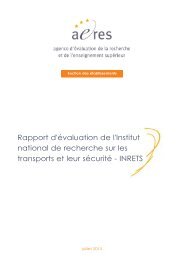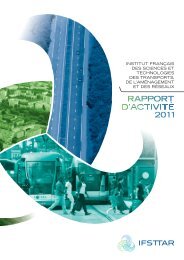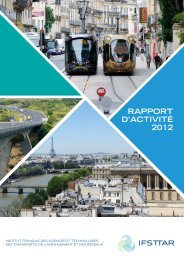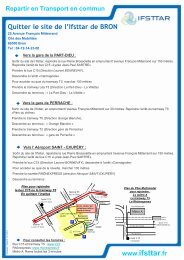french institute of science and technology for transport ... - Ifsttar
french institute of science and technology for transport ... - Ifsttar
french institute of science and technology for transport ... - Ifsttar
You also want an ePaper? Increase the reach of your titles
YUMPU automatically turns print PDFs into web optimized ePapers that Google loves.
a portrait <strong>of</strong> the <strong>institute</strong><br />
A ten-year<br />
scientific strategy<br />
The review <strong>of</strong> the Institute’s scientific approach must prepare<br />
the Institute to consolidate its positions with regard to its areas<br />
<strong>of</strong> excellence, <strong>for</strong>esee developments <strong>and</strong> take up a position<br />
on new challenges. The new issues include the need <strong>for</strong> sustainable<br />
development <strong>and</strong> responses to climate change <strong>and</strong><br />
population ageing, which are areas where we must develop<br />
research approaches that are more systemic <strong>and</strong> multidisciplinary<br />
<strong>and</strong> that give complexity a central place. The scientific<br />
strategy review which got under way in early 2011 <strong>and</strong> the<br />
mutual underst<strong>and</strong>ing seminars identified IFSTTAR’s strengths<br />
<strong>and</strong> added value, not only in terms <strong>of</strong> themes, approaches <strong>and</strong><br />
methods, but also in the interplay between disciplines <strong>and</strong> the<br />
consideration <strong>of</strong> human factors.<br />
In addition to these seminars, a large number <strong>of</strong> discussions<br />
were undertaken with the laboratories in order to specify the<br />
principal research issues <strong>for</strong> the next ten years. These were<br />
then discussed with the Institute’s governance bodies (the<br />
Board <strong>of</strong> Directors, Scientific <strong>and</strong> Technical Board) <strong>and</strong> our<br />
external partners.<br />
Following these discussions, IFSTTAR’s scientific strategy<br />
was finalized, around the following four tasks:<br />
Task 1: Analysis <strong>and</strong> innovation <strong>for</strong> sustainable <strong>and</strong> responsible<br />
mobility.<br />
Task 2: Constructing, deconstructing, preserving <strong>and</strong> modifying<br />
infrastructure efficiently <strong>and</strong> sustainably.<br />
Task 3: Climate change, natural hazards <strong>and</strong> environmental<br />
<strong>and</strong> health impacts in man-made environments.<br />
Task 4: Designing <strong>and</strong> planning sustainable cities <strong>and</strong> regions:<br />
systemic <strong>and</strong> multi-scale approaches.<br />
By their very nature, these tasks cut across disciplinary boundaries<br />
<strong>and</strong> illustrate how IFSTTAR’s research addresses societal<br />
issues. The tasks may also evolve over time. While IFSTTAR’s<br />
first goals <strong>and</strong> per<strong>for</strong>mance contract imposes these tasks <strong>for</strong><br />
the medium <strong>and</strong> long terms, those that follow it will enable<br />
the Institute to update its scientific strategy as societal <strong>and</strong><br />
scientific concerns change.<br />
Last, in order to develop its research activities <strong>and</strong> adapt them<br />
to the issues, needs <strong>and</strong> priorities that have been identified<br />
above, in 2011 IFSTTAR conducted an in-depth review <strong>of</strong><br />
the resources, tools <strong>and</strong> policies that need to be introduced,<br />
consolidated or modified. The changes in question will be introduced<br />
as research directions are modified in order to make<br />
sure the new scientific strategy is adequately resourced.<br />
@ CONTACT<br />
dominique.mignot@ifsttar.fr<br />
A project <strong>for</strong><br />
the <strong>institute</strong>:<br />
A human<br />
adventure<br />
In early 2011, the Managing Director <strong>of</strong> IFSTTAR decided to<br />
initiate a process <strong>of</strong> consideration with a view to developing<br />
a project <strong>for</strong> the Institute, Imagine <strong>Ifsttar</strong>, along the same<br />
lines as a company project. The fundamental aim is to <strong>for</strong>ge<br />
a common culture within IFSTTAR, which is essential if it is to<br />
per<strong>for</strong>m its role successfully.<br />
11<br />
4<br />
iDEX<br />
iNiTiATiVES<br />
OF EXCELLENCE<br />
A*MIDEX<br />
The virtual human<br />
PACA<br />
5<br />
SATT<br />
TECHNOLOGY<br />
TRANSFER<br />
ACCELERATiON<br />
COMPANiES<br />
ÎLE-DE-FRANCE INNOV<br />
Île-de-France<br />
PACA-CORSE<br />
PACA<br />
6<br />
iEED<br />
iNSTiTUTES<br />
OF EXCELLENCE<br />
ON ZERO CARBON<br />
ENERGY<br />
FRANCE ÉNERGIE MARINE<br />
Marine energy<br />
Pays-de-la-Loire <strong>and</strong> PACA<br />
GÉODÉNERGIES<br />
Geothermal, CO 2<br />
sequestration<br />
Centre<br />
VEDECOM<br />
Vehicles <strong>and</strong> <strong>transport</strong><br />
services<br />
Île-de-France<br />
EFFICACITY<br />
Sustainable cities<br />
Île-de-France<br />
The project has three goals:<br />
To create a vision that is shared by all the staff <strong>of</strong> the new<br />
organization created by the merger.<br />
To undertake the trans<strong>for</strong>mations that are necessary <strong>for</strong> it<br />
to per<strong>for</strong>m its role more effectively <strong>and</strong> integrate better in its<br />
scientific, technological <strong>and</strong> societal environment.<br />
To lead its entire staff in a “human adventure” which will give<br />
meaning to their pr<strong>of</strong>essional activities.<br />
The first phase <strong>of</strong> the process involves drafting the project,<br />
which is a document setting out IFSTTAR’s ambitions. This<br />
took up the whole <strong>of</strong> 2011 <strong>and</strong> will continue into 2012. Gradually,<br />
by a process involving concentric circles <strong>and</strong> successive<br />
improvement <strong>of</strong> the project, all the Institute’s staff came to be<br />
involved thanks to an approach that encouraged their active<br />
participation. The management committee <strong>of</strong>ficially launched<br />
the process in May 2011. Next, meetings <strong>of</strong> all the representatives<br />
<strong>of</strong> the Institute’s management were held in June<br />
<strong>and</strong> November 2011. Between these collective meetings, the<br />
teams met <strong>for</strong> working sessions in order to determine the future<br />
organization <strong>of</strong> the Institute in a collegial manner.<br />
The second phase <strong>of</strong> the project will get under way in 2012<br />
when an action plan <strong>for</strong> achieving the goals <strong>of</strong> the Imagine<br />
IFSTTAR project will be implemented.<br />
@ CONTACT<br />
s<strong>and</strong>rine.lefebvre-guillaud@ifsttar.fr<br />
”Focus sur Imagine<br />
IFSTTAR”, an internal<br />
in<strong>for</strong>mation letter on<br />
the project <strong>for</strong> the<br />
Institute.<br />
annual report 2011 ifsttar.fr






![Trajectoire le magazine n°3 - Juillet 2012 [.pdf] - Ifsttar](https://img.yumpu.com/30038493/1/190x253/trajectoire-le-magazine-na3-juillet-2012-pdf-ifsttar.jpg?quality=85)

